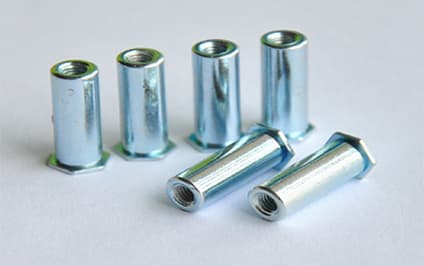Self Clinching Studs are a kind of fixings used to connect materials, usually used in automotive, machinery, electronics and other industries. According to different usage scenarios and needs, Pressure Riveting Studs can be divided into different types. The following introduces several common Pressure Riveting Studs and their differences.

Self-tapping stud: Self-tapping stud is a common pressure riveting stud, which is often used to fix wood, plastic, metal and other materials. The self-tapping stud is characterized by a self-tapping thread on the head, which can be directly punched and fixed on the material. The material of self-tapping studs is usually carbon steel, stainless steel, etc.
Metal rivet studs: Metal rivet studs usually consist of two parts, one is the threaded part and the other is the rivet part. The use of riveted studs can make the connection more secure and can resist vibration and shock. Metal rivet studs are usually made of self clinching fasteners such as aluminum alloy and stainless steel.
Welding studs: Welding studs are usually used in automobiles, machinery and other fields, due to their high reliability, they can withstand large forces and torques. Welding studs usually need to be welded to the material and are relatively fixed in use. The material of welding studs is usually carbon steel, stainless steel, etc.
Special-shaped rivet studs: Special-shaped rivet studs are usually designed in different shapes and specifications according to different use environments. For example, some special-shaped rivet studs have round heads and some have hexagonal heads, which can meet the needs of different scenarios.
The above are several common pressure riveting studs and their differences. Different types of rivet studs are suitable for different scenarios and needs, and need to be selected according to the actual situation before use. We also have self clinching nuts on sale, if you need, please contact us.